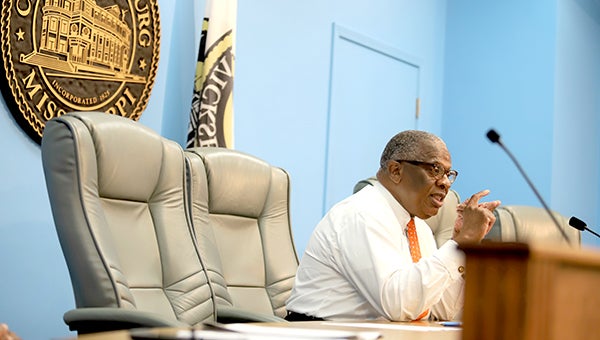Apparent positive change in economy behind strong budget
Published 12:09 pm Friday, September 4, 2020

- Mayor George Flaggs Jr.
An apparent rebounding economy sparked by two consecutive months of strong state sales tax reimbursements despite COVID-19 restrictions has resulted in a proposed $30.45 million fiscal 2021 budget for the city of Vicksburg, with a projected $20,000 surplus.
The board presented the budget at a public meeting Wednesday and it will approve the budget Sept. 10. By law, the city’s budget must be approved and in place by Sept. 15. The new fiscal year begins Oct. 1.
“The stay at home emergency order required a lot of the residents to buy local, and because of that we were able to see our revenues go up,” Mayor George Flaggs Jr. “For some reason, they bought a lot more automobiles and they bought a lot of houses during that particular time and they did a lot of shopping for supplies locally.
“That’s what’s been shocking; the sales tax and the property tax. It speaks volumes to what happens when we shop local first.”
At one point during the summer, city officials were looking at a projected $2.8 million deficit caused by a drop in sales tax and gaming revenue, but sales tax reimbursements to the city for May and June provided a more positive outlook for the economy.
The city’s reimbursement from the state for sales taxes collected in May was $701,860, about $12,587 more than the $689,273 collected in May 2019. The June reimbursement was $696,845, or $61,053 more than the $635,792 received from the state in 2019 — a 9.6 percent increase over the previous year.
Year-to-date figures in August showed the city has received $5.84 million in sales tax revenue, which was less than 1 percent under the $5.88 million total collected by August 2019 with three more months remaining.
The budget projects $8.119 million in property tax revenue from the city’s 35.88 mill property tax and $7.75 million in sales tax revenue for 2021. The sales tax projection is $250,000 less than 2020’s $8 million projection.
Gaming revenue is projected at $5.11 million, or $145,000 less than the 2020 projection. The city projects an additional $3.8 million in fees, court fines and interest.
Flaggs said the 2021 revenue estimates are “conservative projections.”
“If we can meet those conservative projections, we’re going to be fine,” he said. “I’ve always conservatively projected our revenue on the side of caution because if you do that and you exceed the cautious estimate you’re going to end up with a surplus. If you don’t, you’ll always end up with a deficit and you’re going to have to fund it.”
Other steps taken with the budget included spreading the city’s $1.4 million property tax revenue loss from the devaluation of the Baxter Wilson power plant across the board and continuing the policy of preparing the budget based on 97 percent of the revenue from the previous year’s budget.
The board also reduced the city’s work force from 460 employees to 417 through a hiring freeze and combining some positions.
The mayor said he plans to recommend the board consider freezing new contracts — except for emergencies — for 90 days.
“That would significantly put us in a better position going forward so we won’t rush into spending on new projects in the first quarter of the budget year,” he said, adding the board’s spending will be limited by state law during the last quarter of the fiscal year. “That means we have to run off and complete the projects that are (now) on the books. What we’re doing is capping twice on the front end and on the back end.”






